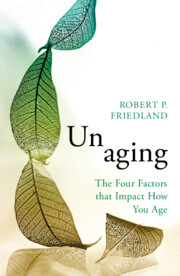Book contents
- Unaging
- Reviews
- Unaging
- Copyright page
- Dedication
- Contents
- List of Figures and Tables
- Preface
- Part I Foundations: What Do We Need to Know about Optimal Aging?
- Part II Applications: What Can We Do about the Opportunity of Aging?
- 12 Overview
- 13 Physical Activity
- 14 Whole Body Health
- 15 Mental Activity
- 16 Psychological Measures
- 17 Social Factors
- 18 Dealing with Stress
- 19 Sleep
- 20 Diet
- 21 Microbial Considerations
- 22 Dental Care
- 23 Dealing with Doctors and Drugs
- 24 Hazardous Behaviors
- 25 Toxic Exposures
- Part III Conclusions
- Acknowledgments
- Glossary
- References
- Index
15 - Mental Activity
from Part II - Applications: What Can We Do about the Opportunity of Aging?
Published online by Cambridge University Press: 15 September 2022
- Unaging
- Reviews
- Unaging
- Copyright page
- Dedication
- Contents
- List of Figures and Tables
- Preface
- Part I Foundations: What Do We Need to Know about Optimal Aging?
- Part II Applications: What Can We Do about the Opportunity of Aging?
- 12 Overview
- 13 Physical Activity
- 14 Whole Body Health
- 15 Mental Activity
- 16 Psychological Measures
- 17 Social Factors
- 18 Dealing with Stress
- 19 Sleep
- 20 Diet
- 21 Microbial Considerations
- 22 Dental Care
- 23 Dealing with Doctors and Drugs
- 24 Hazardous Behaviors
- 25 Toxic Exposures
- Part III Conclusions
- Acknowledgments
- Glossary
- References
- Index
Summary
A life filled with learning is advisable. Tasks involving some degree of cognitive complexity is desirable, but there is no reason to believe that certain forms of learning are better than others. What is critical is that the activity needs to be consistent and persistent. Involvement of cognitive activity at work is important and jobs that involve high stress, passive participation, and lack of complexity are associated with higher levels of cognitive impairment in later life. There is also no reason to believe that mental activities must be limited to the early years of life. People are able to learn at all ages and participation in learning is valuable for the brain throughout life. The concept of diversity refers as well to learning and mental activities. It is good to learn new things! Participation in cognitive activities throughout the lifespan both at home and at work and avoiding multi-tasking can help build cognitive reserve capacity. Cognitive activities directly impair disease processes. Being cognitively active and paying attention to the world helps to protect the brain from free radicals and toxins. Cognitive activities also assists in the management of stress.
Keywords
Information
- Type
- Chapter
- Information
- UnagingThe Four Factors that Impact How You Age, pp. 200 - 205Publisher: Cambridge University PressPrint publication year: 2022
